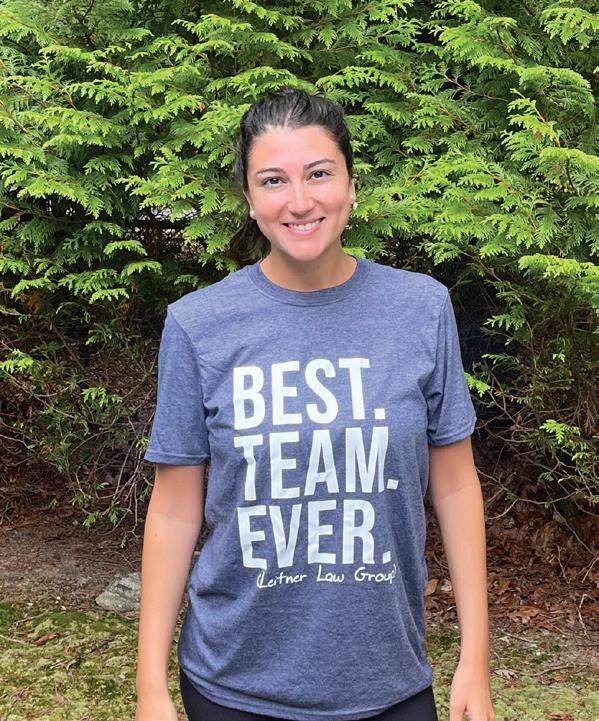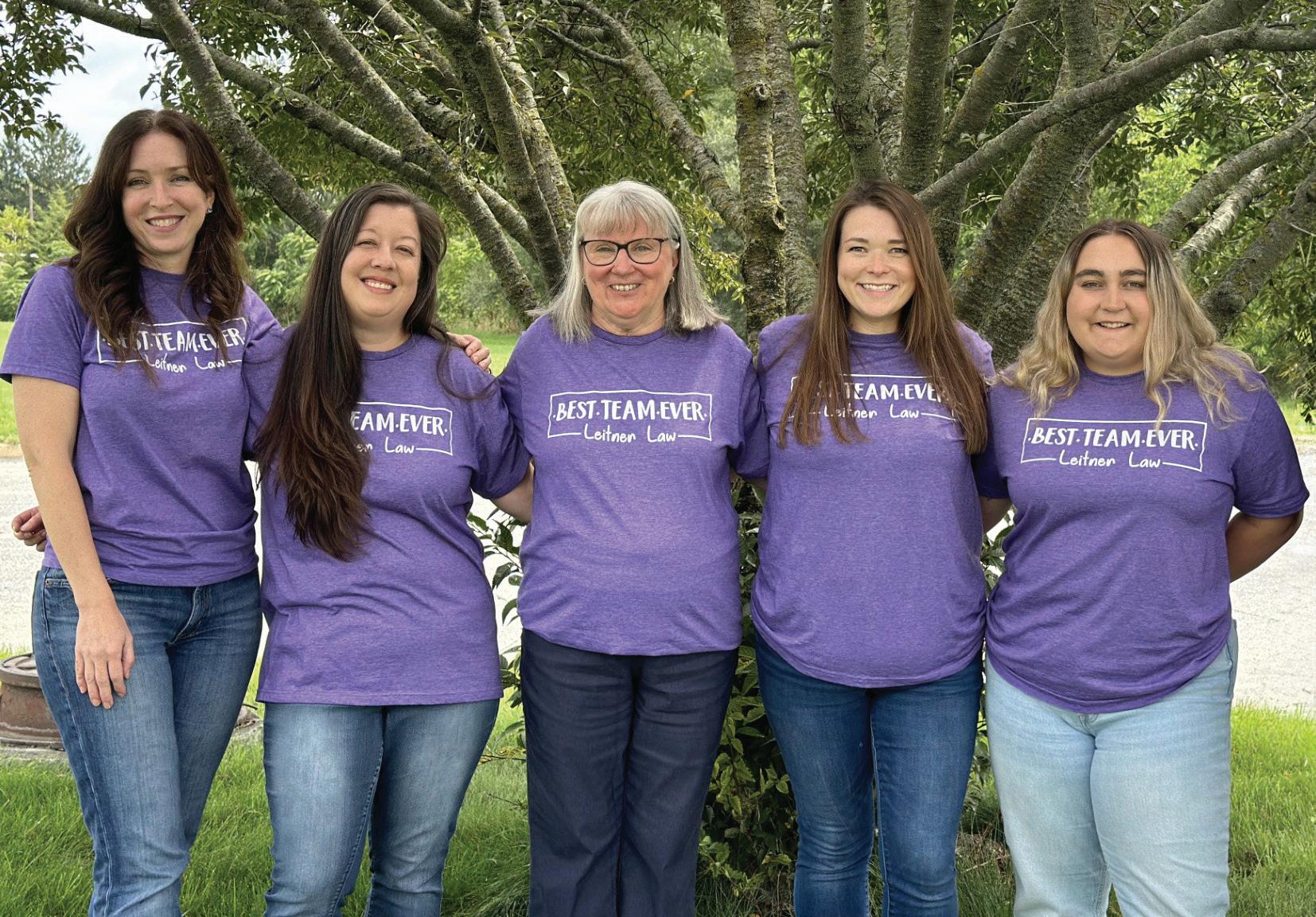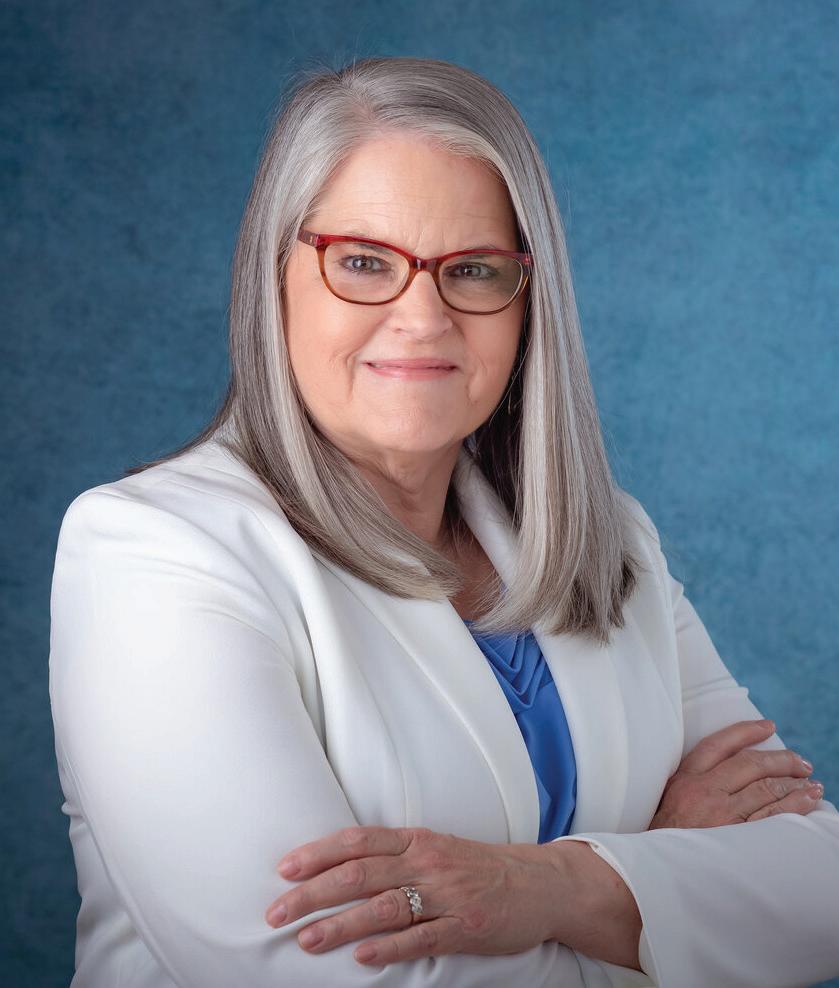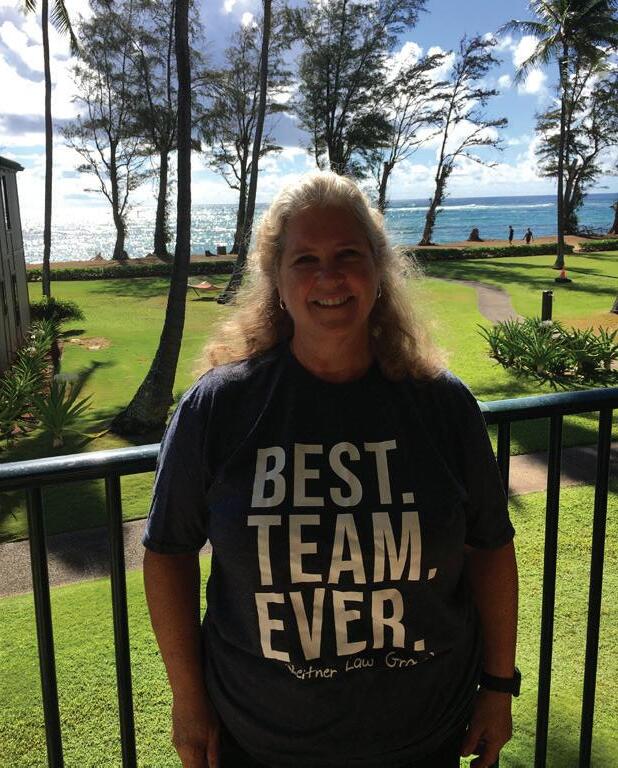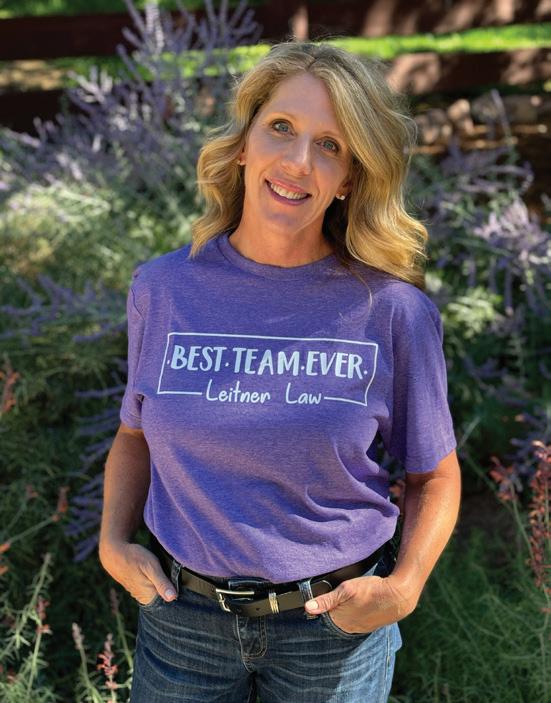














Amanda Atwell finds success by combining a passion for both cats and cooking
By RICHARD H. HRONIK III
Daily News-Record
For Amanda Atwell, owner of Aristocat Cafe and Tea House in downtown Harrisonburg, starting her business was about combining two of her passions.
The cafe, which opened on North Liberty Street in April 2023, features coffee beverages and over 90
different varieties of tea, and reserved time slots for what the cafe’s website calls “The Loft” — a large room separate from the cafe dining room that can house up to 16 cats at a time, outfitted for their needs with cat trees, scratching posts, ledges mounted on the walls and windows, and more.
Rather than adopt a clowder of cats, Atwell elected to partner with the Humane Society of Shenandoah
Amanda Atwell, owner of Aristocat Cafe, rings up a customer behind the counter. “I’d always loved the idea of putting the two together [cats and cooking],” she said. “I’d also been a foster [for cats] since I was 16, working both with local organizations and independently. I was just like, ‘That doesn’t exist, come on, you can’t do that with food regulations, things like that.’”
County, with the cafe acting as a foster for HSSC. As such, visitors who grow attached to a specific cat can adopt the cat in question if they choose. As of Sept. 27, 160 cats had been adopted from the cafe since it opened, according to Atwell.
Before opening the cafe, Atwell said she wanted to combine her love of cats with her love of cooking.
“I’m a classically trained chef. I’d been doing that for 12 years and worked at some awesome local restaurants,” Atwell explained. “But after eight years, and COVID, of course ... I’d always loved the idea of putting the two together. I’d also been a foster [for cats] since I was 16, working both with local organizations and independently. I was just like, ‘That doesn’t exist, come on, you can’t do that with food regulations, things like that.’”
However, when Atwell and her husband happened upon a cat cafe while traveling in Quebec, Canada, she knew what she wanted to make was real. From then on, she would always look for cat cafes when
See RECIPE, Page A5
Karen Mercer and her husband are capitalizing on alpaca’s plush potential
By LEE ZION Daily News-Record
ELKTON — Karen Mercer knows how to spin a yarn.
Mercer, the owner of a small alpaca farm in the Shenandoah Valley, and her husband have become known for the beautiful alpaca yarn and products they sell.
Originally, Mercer wanted to get into raising miniature goats, but her career went a bit sideways, and now she raises alpacas instead. Her farm east of Elkton is called Diamonds in the Fluff.
About 10 years ago, Mercer was looking for something other than her day-to-day job as an accountant.
“I moved from working at JMU to UVA, and I told my husband, I said, ‘OK, I want my animals,’” she said.
The couple owned 12 acres. At the time, there was no livestock — just peacocks and chickens. Her husband, Stuart, didn’t want to have poop on what she called his “pristine pastures.”
She was thinking about miniature goats, but the couple met a woman who had a herd of 40 alpacas. Mercer said the woman was leaving the alpaca business for health reasons.
So they bought four alpacas from her. In 11 months, those four became seven.
Mercer started selling the yarn at a store in Harrisonburg, where it was already in existence. But once she retired, Mercer began knitting. Now, she sells the yarn mainly through home visits and the few shows she attends every year.
Mercer describes alpaca as a luxury fiber.
“It’s softer than cashmere, warmer than wool. Hypoallergenic because it doesn’t have lanolin,” she said.
The best part is they leave less of an impact on the environment. They take care of their business in communal dung piles. That makes good fertilizer, Mercer said.
“So they’re not a walking, talking
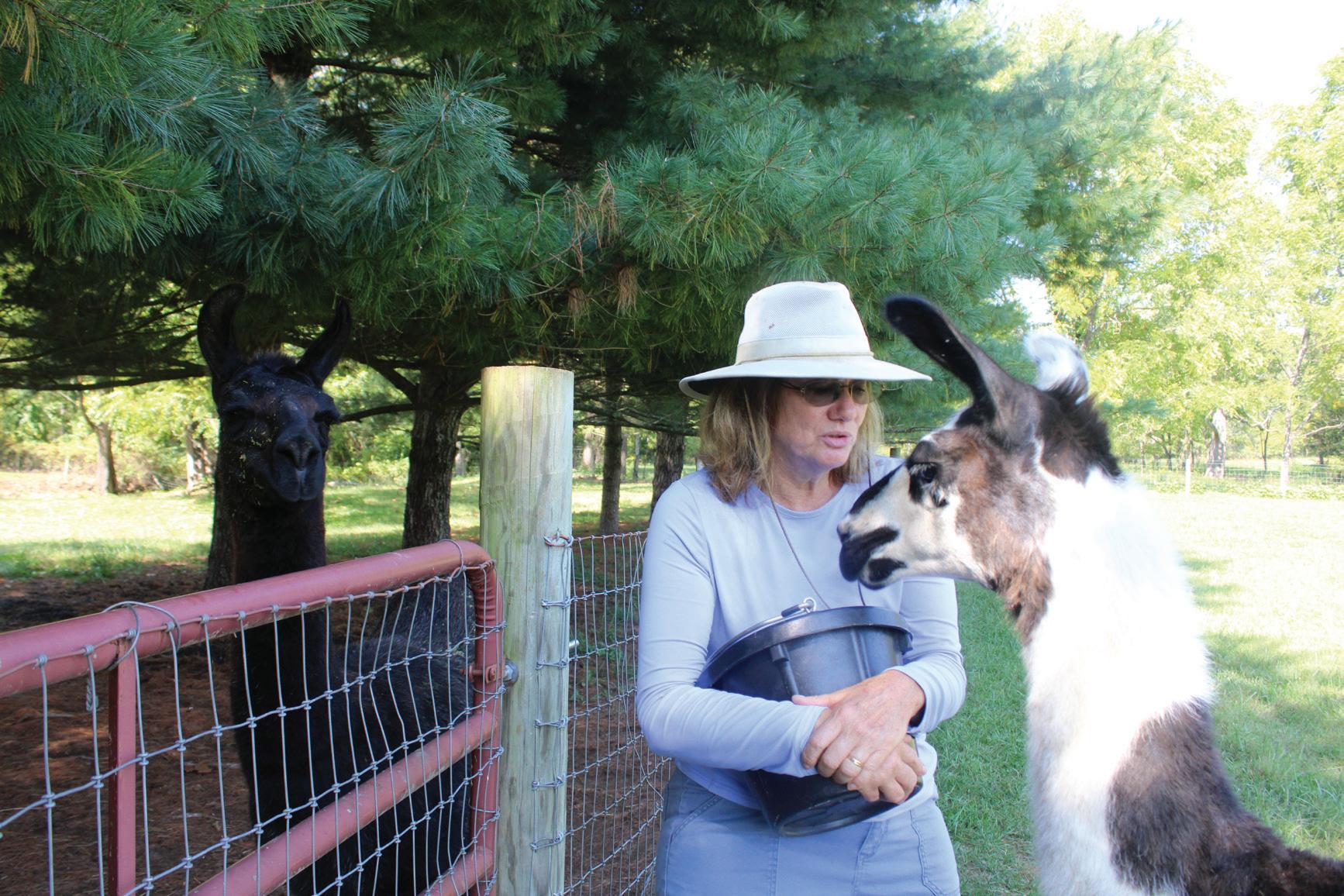
poop machine like a goat, which I really love,” she said.
And that may have helped ease her husband’s concerns.
Goats, meanwhile, will poop anywhere, including in their own manger area. So it’s possible fecal matter can get into the food, and if one animal has a parasite, this will spread the parasite to other animals, Mercer said.
On another note, goats are escape artists.
Before contacting that woman long ago, Mercer had never seen an alpaca
See FASHION, Page A4

up close.

Offering personalized, evidence-based, & integrative gynecology and primary care
“When we visited the farm and saw them, we fell in love with them,” she said. Both of them — her AND husband Stuart. When one of her alpacas went into labor, Stuart was there to assist in the birthing process. Now, that alpaca baby, Cappuccino, recognizes Stuart as a daddy of sorts.
We o er comprehensive annual exams and preventative primary care; and personalized treatments for each individual.
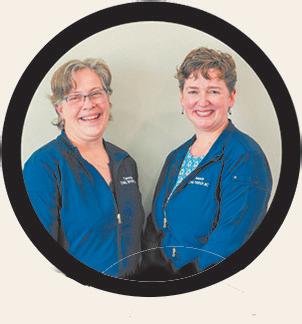
Mercer shows off her boys. “Red” provides a lovely brown wool, she said. Saint, meanwhile, is the pig among
119-B University Blvd, Harrisonburg, VA 22801
Office: 540-575-5245
www.plena-ihc.com
Online scheduling available!
Alpacas do not have upper teeth in front. When visitors feed the alpacas,

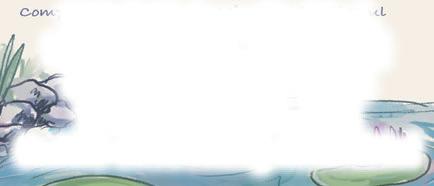

the alpacas.
up close.
“When we visited the farm and saw them, we fell in love with them,” she said. Both of them — her AND husband Stuart. When one of her alpacas went into labor, Stuart was there to assist in the birthing process. Now, that alpaca baby, Cappuccino, recognizes Stuart as a daddy of sorts.
Mercer shows off her boys. “Red” provides a lovely brown wool, she said. Saint, meanwhile, is the pig among
Alpacas do not have upper teeth in front. When visitors feed the alpacas, holding their hands out, they are pleasantly surprised.
Later that day, Mercer showed off some alpaca wool. Baby alpaca provides the softest, most luxurious fiber, she said.
“This is baby alpaca wool. Feel that fluff. That’s straight off the animal,” she said. “I get a lot of enjoyment out of knitting from fiber from

an animal. I know exactly where it came from.”
One cardigan sweater took five skeins — 1,000 yards of fiber — to make. Mercer said a similar amount, up to 1,200 yards, goes into a pullover sweater.
One alpaca can produce about 45 skeins of fiber, she said.
People are invited to visit her farm for alpaca farm tours. People can feed the alpacas by hand and also look at alpaca wool products in her store. Small groups of school children, mostly home-schooled, also visit.
She will not, however, take the alpacas to schools or take them out for a petting zoo exhibit. The only time the alpacas leave the farm is if they have to visit a veterinarian or for breeding.
“Alpacas are herd animals,” Mercer said. “And so they’re comfortable in groups of three, preferably five. And so if I took one or two somewhere, they’d be in high anxiety. And I wouldn’t want to do that to them.”
Some farmers raise alpacas in a petting zoo environment or even put them in tuxedos to join a wedding
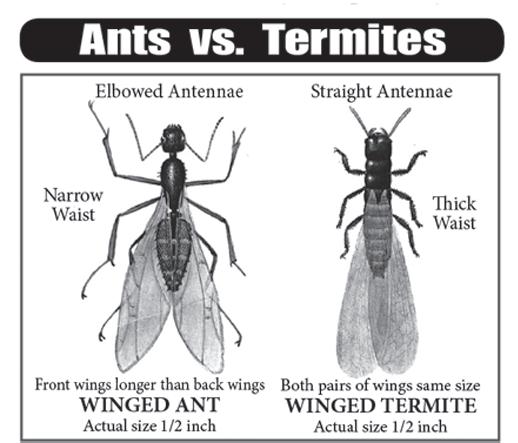

party. Mercer said that when they’re brought up in that environment, they seem to do well.
Her last stop on her tour is in her house, where many of her alpaca products are displayed. She knits everything herself and dyes everything herself.
When Mercer sells an item, she attaches a picture of the animal the knitted yarn came from, along with her card. She also enters her products into the Rockingham County Fair, and if a winning item sells, she lets the customer keep the ribbon she won.
It took about five years for her alpaca farm to turn a profit, which she said is typical in the industry. She also got help from the Small Business Development Center in Harrisonburg.
“They have helped me tremendously — where to market, where to advertise. Assistance in selling yarn,” she said.
Most of her sales come from home visits. On one such visit, Mercer said she was wearing one of her alpaca shrugs, which eventually led the customer to buy $700 worth of alpaca yarn.
“So, marketing to that select population that wants the natural fibers and that wants to support small business has been huge for us,” she said.
Mercer loves her alpacas.
“They’re livestock; they’re animals. But I think they’re pretty cool livestock animals,” she said.
Contact Lee Zion at lzion@dnronline.com or 540-208-3174.
traveling to learn from them and see what she could add to her dream. Even now, she looks for inspiration as far as 30 minutes away from her vacation destination to look for ways Aristocat can improve.
As she continued to travel, Atwell would find cat cafes across the world and learn more about how they operate. Over time, she would manifest her desire and open Aristocat. Now that the business is up and running, Atwell says it’s all about the animals.
“You know, the cats are really the heart of all that,” Atwell said. “The Humane Society has been absolutely amazing. We could not have asked for a better partner. Supportive, kind, friendly, on the ball. They help us with everything you would expect and then some. They go above and beyond.”
However, Atwell designed Aristocrat to be different from cafes she visited in a few key ways. While at other cafes, the cats may be free to explore the entire space, at Aristocat, she has sequestered them in a separate room where customers can enjoy them through several large windows. Atwell says this idea, taken from a cat cafe in North Carolina, helps ensure access for all who want to enjoy their company – including herself.
“That’s actually the laws there,” Atwell said of the cafe where she first learned of the idea. “But, we also didn’t want people to be forced to interact with a cat if they didn’t want to. We didn’t want to pigeonhole ourselves into such a niche here that we ostracized any part of our community.”
The cafe also offers free wi-fi for customers, which Atwell says is intended for anyone who wants to spend time at the cafe getting work done.
In addition to running Aristocat, Atwell finds time to spend with her family, including her husband and two children, ages three and six.
“One of the perks of being the boss is I do make the schedule,” Atwell said. “So, while I am here every day that we’re open, you know, I try to be the opener to the mid so that I can be home in the afternoons to the evenings for my family. We are here from Thursday to Sunday. That gives me Monday and Tuesday and a good portion of Wednesday to be with my family.”
Atwell added that she knew she had a choice of starting her business when her children were young or waiting until they were teenagers. She said she chose to do it sooner rather than later, realizing the scheduling would only be
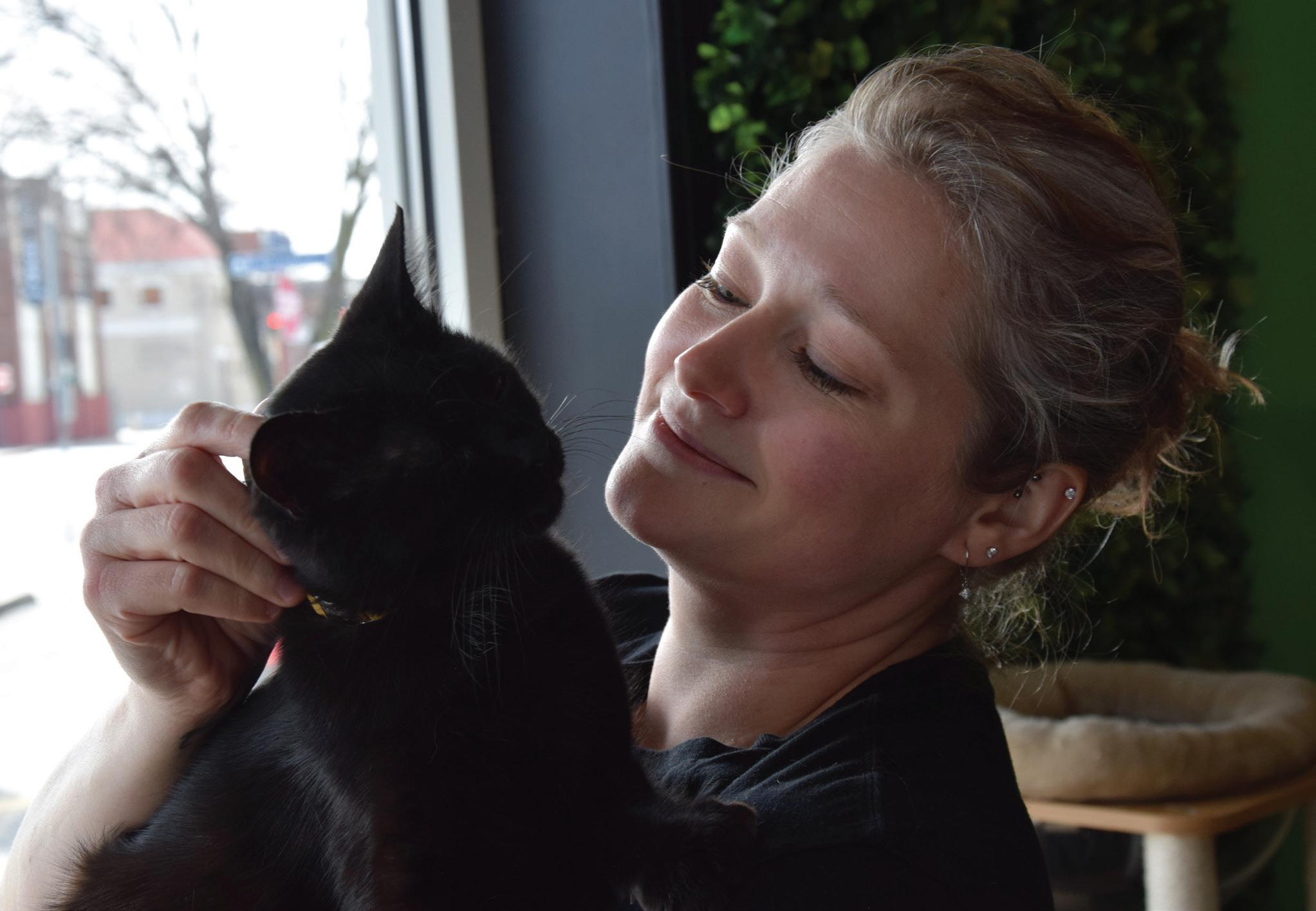
more difficult once her children were in more extracurricular activities like sports and clubs in their teenage years.
As for now, both children get along very well with the cats, Atwell said.
For more information about Aristocat, visit the cafe’s website or call (540) 584-0020.
Contact Richard H. Hronik III at rhronik@dnronline.com, 540-208-





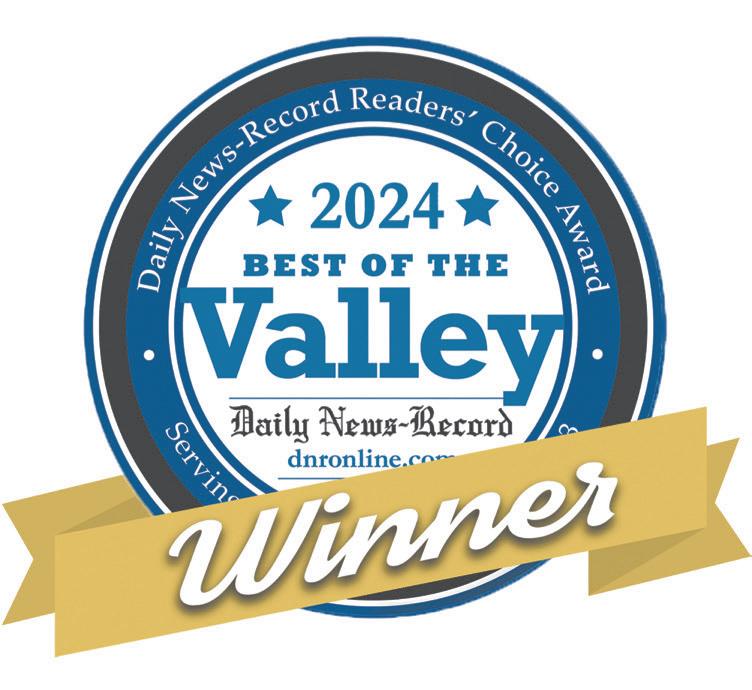

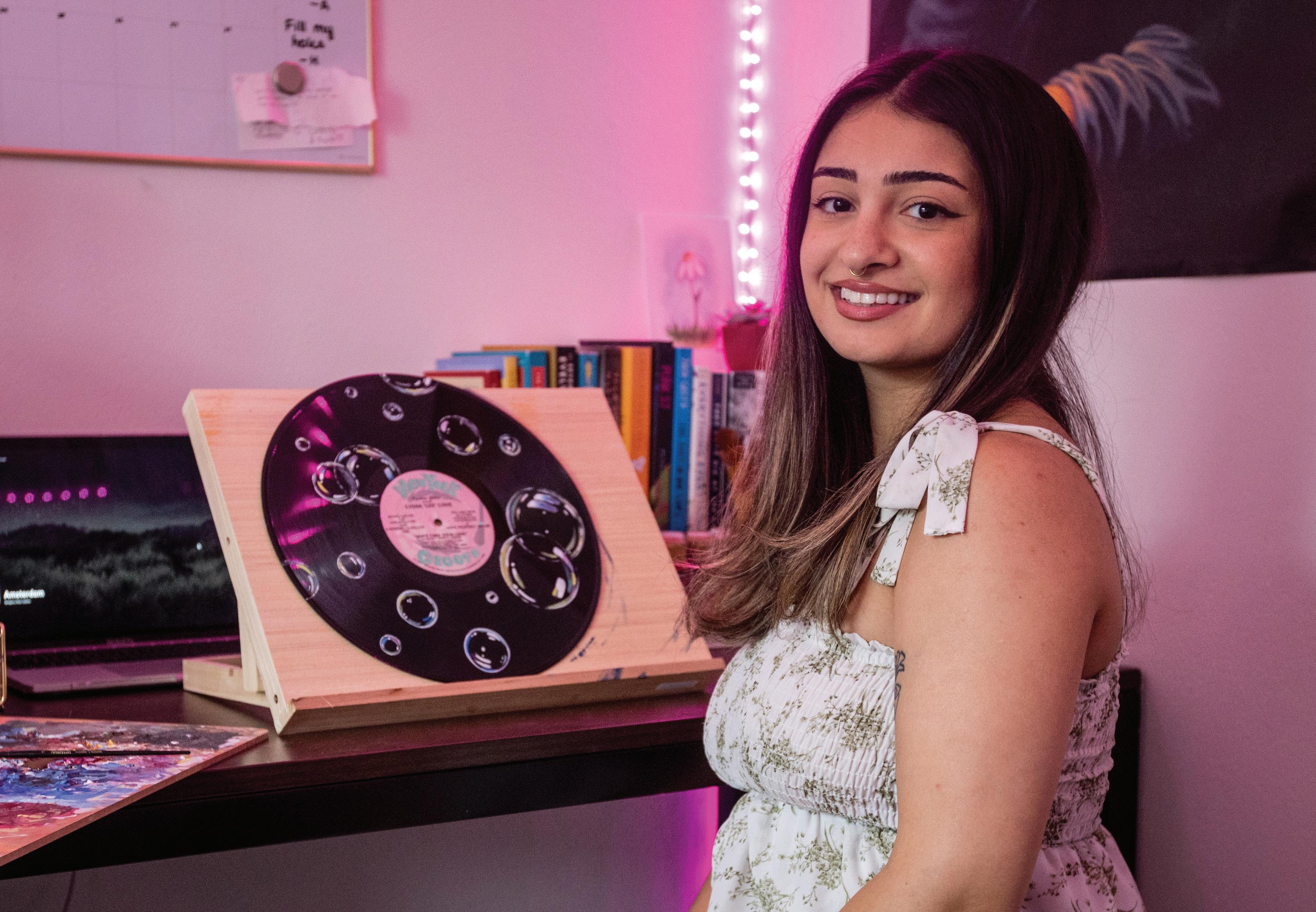
JMU art student paints the personal, the political, and the popular
By ANYA SCZERZENIE Daily News-Record
Rojeana Rofougar’s art can be political, popular, simple or complex, depending on who she’s painting for.
When painting for class or for herself, she often takes inspiration from political causes like environmentalism or the “woman, life, freedom” movement in Iran, where her
family is from. However, for Rojeana’s Studio, her small business, she paints what she thinks will appeal most to her fellow James Madison University students.
“I think of my paintings for selling as a whole different realm than the paintings I put into shows and galleries,” Rofougar said. “When I think of paintings for selling, I think, ‘What do people like?’”
A fifth-year senior in JMU’s
studio art program, Rofougar’s eventual goal is to be a fine artist whose work is displayed in galleries. But until then, she has been honing her skills, “getting her name out there,” and making extra money by being a member of Student-Made.
Student-Made at JMU is a collective of student crafters and artisans who get together to sell their creations online and at pop-up shops. Often, they sell at the JMU farmer’s market.
It was through this organization that Rofougar opened her small business, Rojeana’s Studio.
“I joined Student Made when they launched here at JMU, which was, I believe, October 2022,” Rofougar said. “I’d always been an artist, but I never really had the opportunity to put my work out there.”
Rofougar has not been able to sell much at the farmer’s market due to scheduling conflicts but said she plans to prioritize it this semester. She was unsatisfied with her sales last year because she couldn’t attend markets often.
“I’m looking forward to being at the pop-up shops, hopefully making a lot more sales,” Rofougar said.
The best-sellers at Rojeana’s Studio are painted vinyls. The vinyls can be hung on walls to decorate rooms and are popular accessories for student housing.
Rofougar usually buys blank vinyl in bulk to paint on since she says she would feel bad if she painted on one with music on it. The painted vinyls sell for about $15 to $25, depending on the pattern.
One of Rofougar’s most popular painted vinyl features the flower-shaped multicolored bubbles from SpongeBob SquarePants. She paints each vinyl individually by hand and describes the process of painting the bubbles as rhythmic.
“I started with the vinyl paintings because I knew canvas paintings are pretty typical, and I thought, let’s do something that grabs people’s attention,” Rofougar said.
Other vinyls she has painted include realistic bubbles, mushrooms, and hands touching —and the bubbles are her favorite.
“I kind of found the groove. How do I apply the paint? Which colors should I do first?” Rofougar said.
She also paints small canvases that are made into fridge magnets, which feature subjects like melting smiley faces and sunsets over water. As many
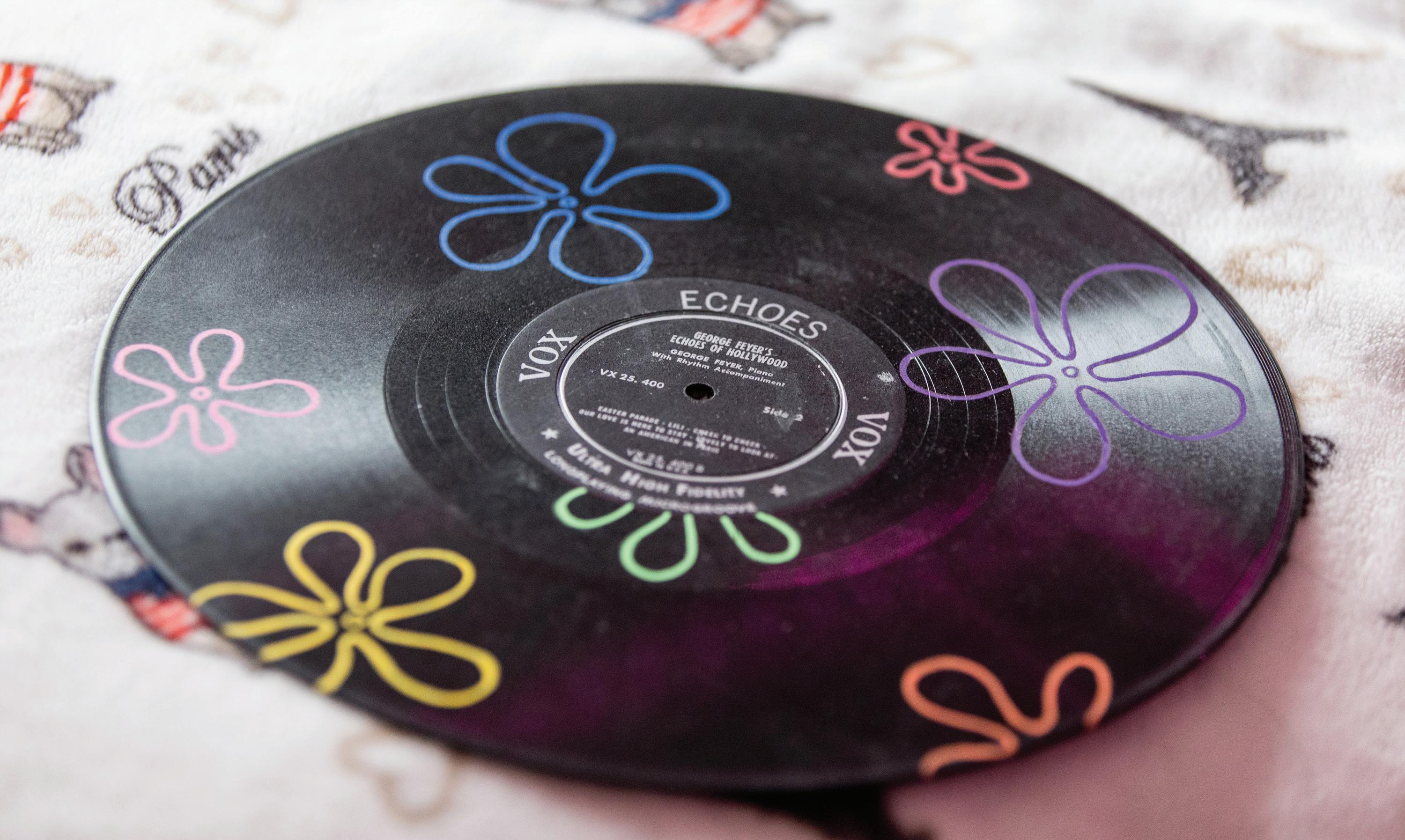
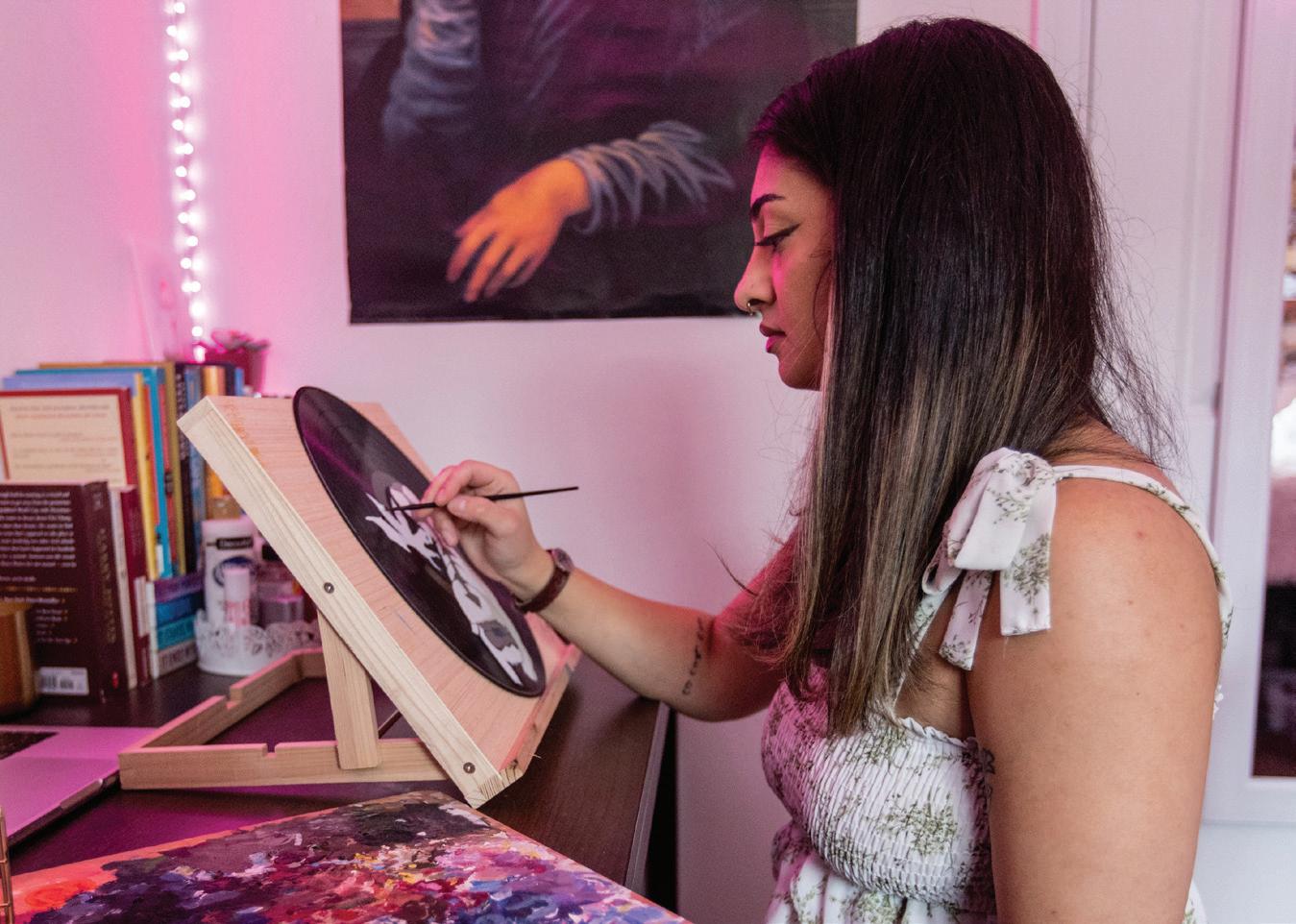
of the Student-Made creators do, Rofougar also has a few JMU-themed items.
Rofougar said she wants to expand her business soon to sell prints and bookmarks of her other artwork.
“I feel constrained when it comes to my business side of things, but I want to expand and bring in my work that I’m passionate about,” Rofougar said. “But it just takes time.”
Though she is primarily a painter, Rofougar has been branching out. She recently tried her hand at ceramics, which she wants to sell this semester, and has done a single piece of performance art — something she described as a powerful experience.
Rofougar is an Iranian American who supports Iran’s “woman, life, freedom” protest movement. The movement formed after the murder of a
young woman named Mahsa Amini, who was killed for not wearing a hijab in accordance with the strict government standards in the country. The movement seeks to gain more rights for women in Iran, including the right not to wear a hijab.
“I have a soapbox that I made and a cloth roll that has names of hundreds that died due to the violence by the Islamic regime in Iran,” Rofougar said. “I pleaded in Persian. The idea is that no one has any idea what I’m saying, but it’s about the passion of my words.”
During the performance, Rofougar cuts her own hair, as many Iranian women did in protest of compulsory hijab laws. She has done the performance twice, and her hair has grown long again since the last time she performed.
Rofougar also works at the gallery on campus. However, no matter what she does, she still eventually finds time to paint vinyls for her business.
“No matter what I paint and draw, I find joy in it,” Rofougar said. “At the end of the day, I’m still making art, so I do enjoy it.”
Contact Anya Sczerzenie at asczerzenie@ dnronline.com or 540-208-6789.

